Business Ethics Report: Ladbrokes, Ethical Theories, Reflection
VerifiedAdded on 2023/01/07
|11
|3853
|2
Report
AI Summary
This report examines the business ethics of Ladbrokes, a British gambling and betting organization, focusing on its ethical practices and the impact on its employees. The report analyzes a case study involving job losses due to shop closures and the ethical implications of employee incentives to sign up more gamblers. It explores the perspectives of employees and stakeholders, highlighting ethical dilemmas and challenges. Furthermore, the report discusses utilitarian and deontological ethical theories, providing a framework for understanding the ethical dimensions of Ladbrokes' actions. It also includes suggestions for improving ethical practices and emphasizes the importance of considering employee welfare and societal impact. The report concludes with a reflection on ethical leadership and the role of business in society.
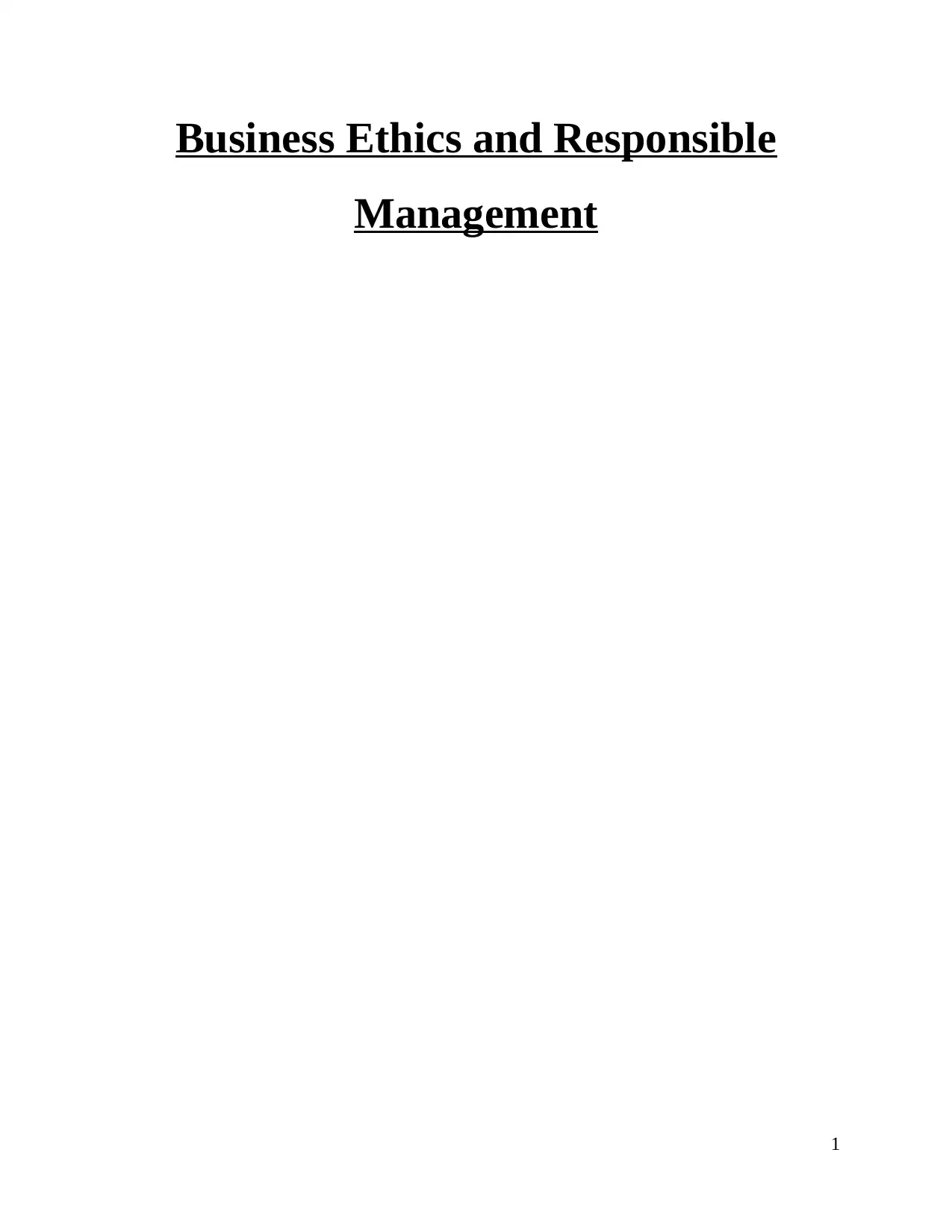
Business Ethics and Responsible
Management
1
Management
1
Paraphrase This Document
Need a fresh take? Get an instant paraphrase of this document with our AI Paraphraser
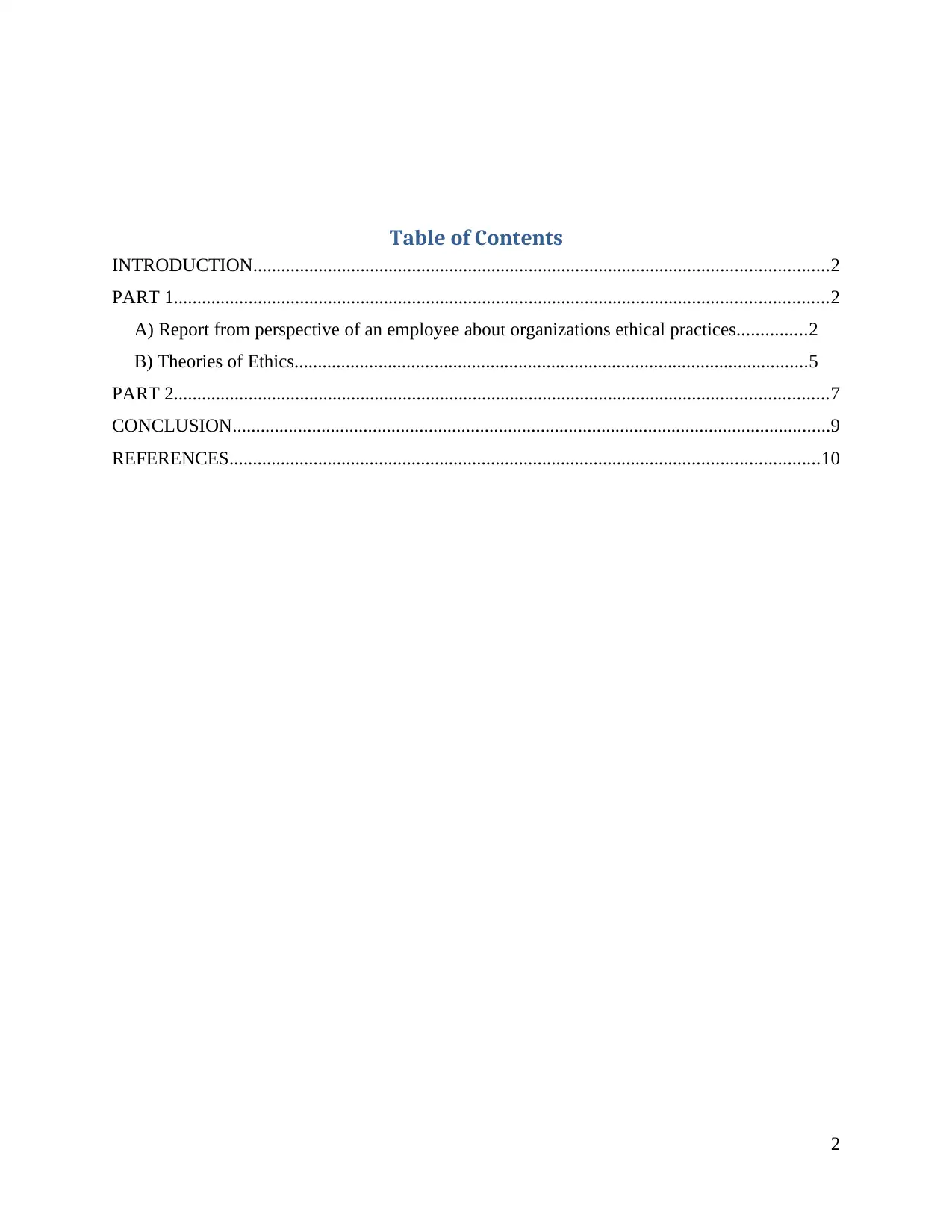
Table of Contents
INTRODUCTION...........................................................................................................................2
PART 1............................................................................................................................................2
A) Report from perspective of an employee about organizations ethical practices...............2
B) Theories of Ethics..............................................................................................................5
PART 2............................................................................................................................................7
CONCLUSION................................................................................................................................9
REFERENCES..............................................................................................................................10
2
INTRODUCTION...........................................................................................................................2
PART 1............................................................................................................................................2
A) Report from perspective of an employee about organizations ethical practices...............2
B) Theories of Ethics..............................................................................................................5
PART 2............................................................................................................................................7
CONCLUSION................................................................................................................................9
REFERENCES..............................................................................................................................10
2
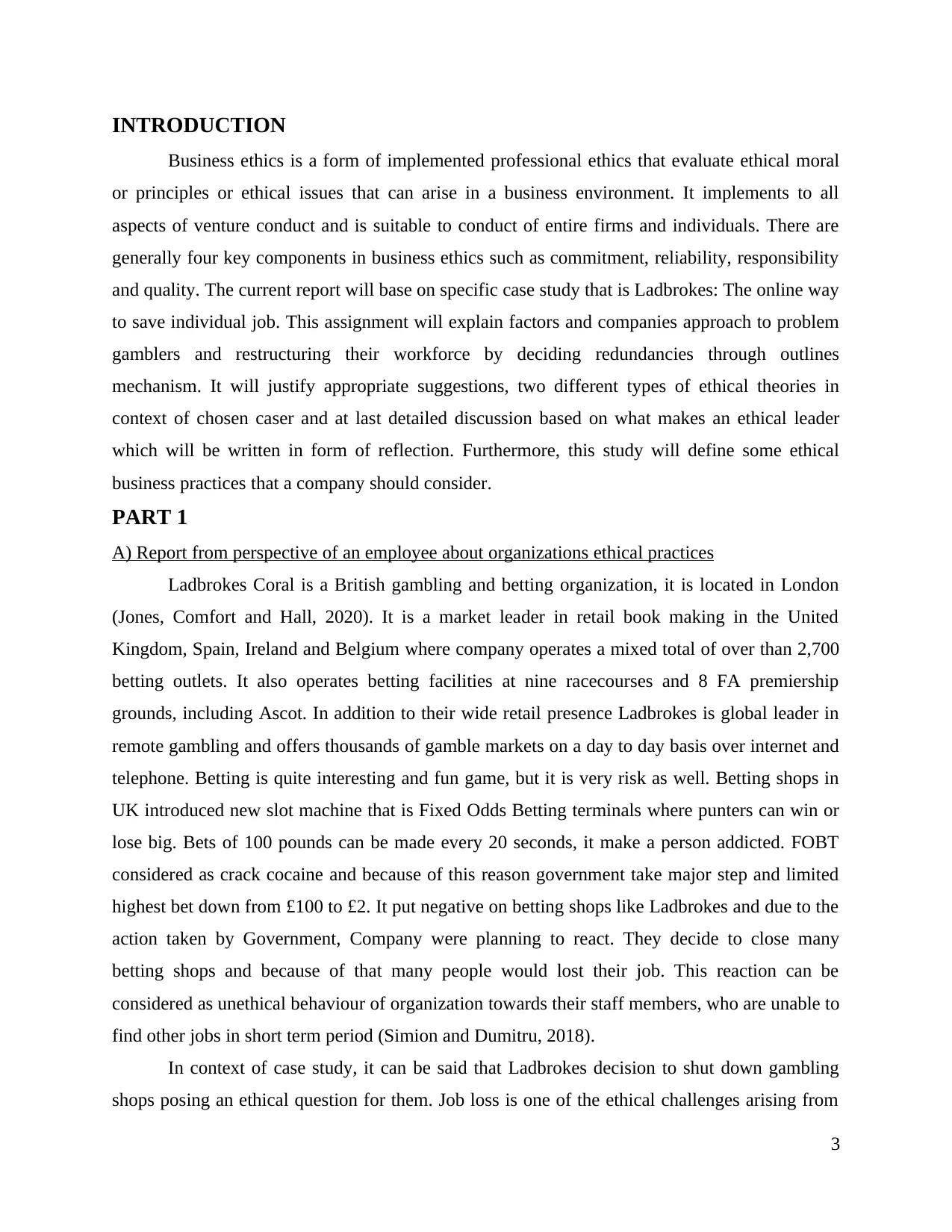
INTRODUCTION
Business ethics is a form of implemented professional ethics that evaluate ethical moral
or principles or ethical issues that can arise in a business environment. It implements to all
aspects of venture conduct and is suitable to conduct of entire firms and individuals. There are
generally four key components in business ethics such as commitment, reliability, responsibility
and quality. The current report will base on specific case study that is Ladbrokes: The online way
to save individual job. This assignment will explain factors and companies approach to problem
gamblers and restructuring their workforce by deciding redundancies through outlines
mechanism. It will justify appropriate suggestions, two different types of ethical theories in
context of chosen caser and at last detailed discussion based on what makes an ethical leader
which will be written in form of reflection. Furthermore, this study will define some ethical
business practices that a company should consider.
PART 1
A) Report from perspective of an employee about organizations ethical practices
Ladbrokes Coral is a British gambling and betting organization, it is located in London
(Jones, Comfort and Hall, 2020). It is a market leader in retail book making in the United
Kingdom, Spain, Ireland and Belgium where company operates a mixed total of over than 2,700
betting outlets. It also operates betting facilities at nine racecourses and 8 FA premiership
grounds, including Ascot. In addition to their wide retail presence Ladbrokes is global leader in
remote gambling and offers thousands of gamble markets on a day to day basis over internet and
telephone. Betting is quite interesting and fun game, but it is very risk as well. Betting shops in
UK introduced new slot machine that is Fixed Odds Betting terminals where punters can win or
lose big. Bets of 100 pounds can be made every 20 seconds, it make a person addicted. FOBT
considered as crack cocaine and because of this reason government take major step and limited
highest bet down from £100 to £2. It put negative on betting shops like Ladbrokes and due to the
action taken by Government, Company were planning to react. They decide to close many
betting shops and because of that many people would lost their job. This reaction can be
considered as unethical behaviour of organization towards their staff members, who are unable to
find other jobs in short term period (Simion and Dumitru, 2018).
In context of case study, it can be said that Ladbrokes decision to shut down gambling
shops posing an ethical question for them. Job loss is one of the ethical challenges arising from
3
Business ethics is a form of implemented professional ethics that evaluate ethical moral
or principles or ethical issues that can arise in a business environment. It implements to all
aspects of venture conduct and is suitable to conduct of entire firms and individuals. There are
generally four key components in business ethics such as commitment, reliability, responsibility
and quality. The current report will base on specific case study that is Ladbrokes: The online way
to save individual job. This assignment will explain factors and companies approach to problem
gamblers and restructuring their workforce by deciding redundancies through outlines
mechanism. It will justify appropriate suggestions, two different types of ethical theories in
context of chosen caser and at last detailed discussion based on what makes an ethical leader
which will be written in form of reflection. Furthermore, this study will define some ethical
business practices that a company should consider.
PART 1
A) Report from perspective of an employee about organizations ethical practices
Ladbrokes Coral is a British gambling and betting organization, it is located in London
(Jones, Comfort and Hall, 2020). It is a market leader in retail book making in the United
Kingdom, Spain, Ireland and Belgium where company operates a mixed total of over than 2,700
betting outlets. It also operates betting facilities at nine racecourses and 8 FA premiership
grounds, including Ascot. In addition to their wide retail presence Ladbrokes is global leader in
remote gambling and offers thousands of gamble markets on a day to day basis over internet and
telephone. Betting is quite interesting and fun game, but it is very risk as well. Betting shops in
UK introduced new slot machine that is Fixed Odds Betting terminals where punters can win or
lose big. Bets of 100 pounds can be made every 20 seconds, it make a person addicted. FOBT
considered as crack cocaine and because of this reason government take major step and limited
highest bet down from £100 to £2. It put negative on betting shops like Ladbrokes and due to the
action taken by Government, Company were planning to react. They decide to close many
betting shops and because of that many people would lost their job. This reaction can be
considered as unethical behaviour of organization towards their staff members, who are unable to
find other jobs in short term period (Simion and Dumitru, 2018).
In context of case study, it can be said that Ladbrokes decision to shut down gambling
shops posing an ethical question for them. Job loss is one of the ethical challenges arising from
3
⊘ This is a preview!⊘
Do you want full access?
Subscribe today to unlock all pages.

Trusted by 1+ million students worldwide
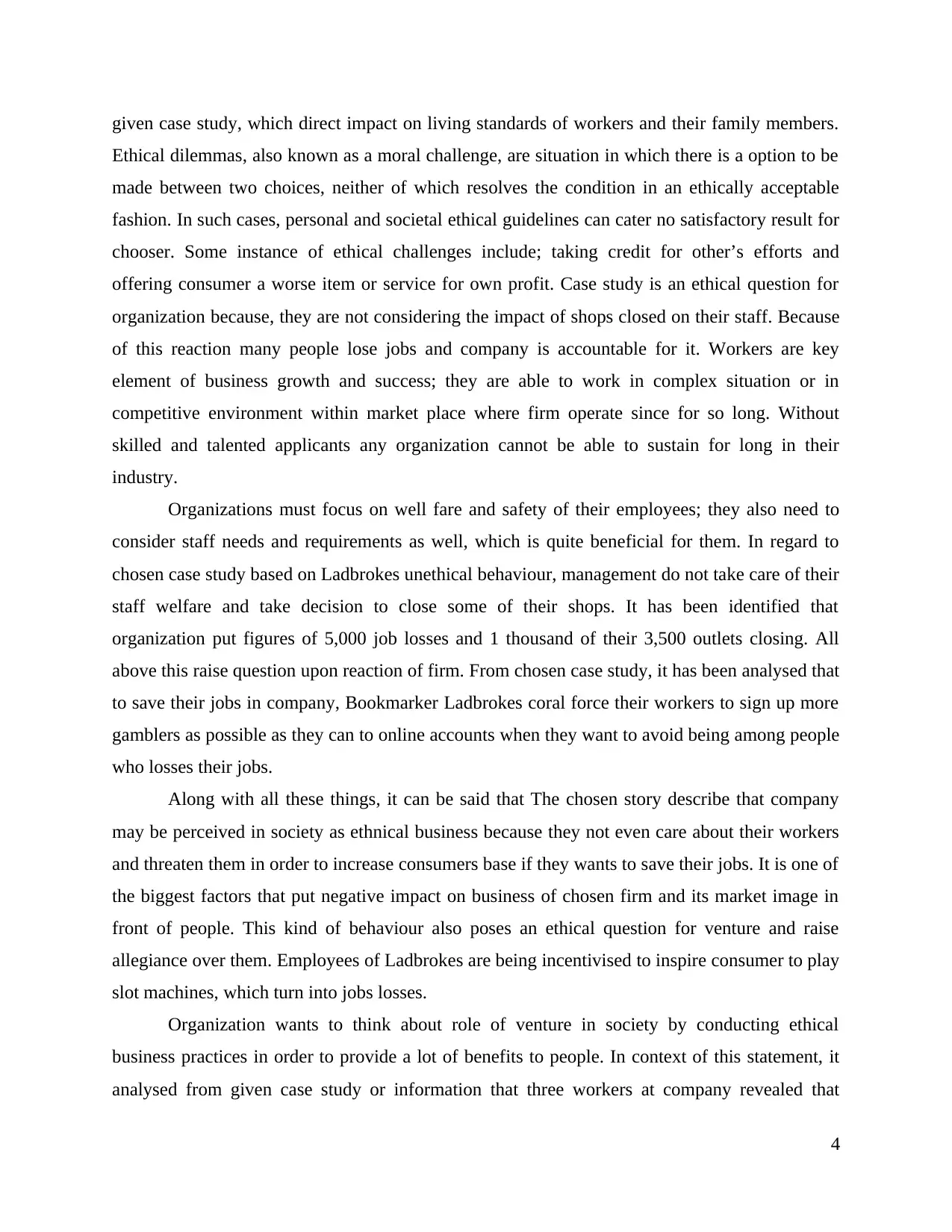
given case study, which direct impact on living standards of workers and their family members.
Ethical dilemmas, also known as a moral challenge, are situation in which there is a option to be
made between two choices, neither of which resolves the condition in an ethically acceptable
fashion. In such cases, personal and societal ethical guidelines can cater no satisfactory result for
chooser. Some instance of ethical challenges include; taking credit for other’s efforts and
offering consumer a worse item or service for own profit. Case study is an ethical question for
organization because, they are not considering the impact of shops closed on their staff. Because
of this reaction many people lose jobs and company is accountable for it. Workers are key
element of business growth and success; they are able to work in complex situation or in
competitive environment within market place where firm operate since for so long. Without
skilled and talented applicants any organization cannot be able to sustain for long in their
industry.
Organizations must focus on well fare and safety of their employees; they also need to
consider staff needs and requirements as well, which is quite beneficial for them. In regard to
chosen case study based on Ladbrokes unethical behaviour, management do not take care of their
staff welfare and take decision to close some of their shops. It has been identified that
organization put figures of 5,000 job losses and 1 thousand of their 3,500 outlets closing. All
above this raise question upon reaction of firm. From chosen case study, it has been analysed that
to save their jobs in company, Bookmarker Ladbrokes coral force their workers to sign up more
gamblers as possible as they can to online accounts when they want to avoid being among people
who losses their jobs.
Along with all these things, it can be said that The chosen story describe that company
may be perceived in society as ethnical business because they not even care about their workers
and threaten them in order to increase consumers base if they wants to save their jobs. It is one of
the biggest factors that put negative impact on business of chosen firm and its market image in
front of people. This kind of behaviour also poses an ethical question for venture and raise
allegiance over them. Employees of Ladbrokes are being incentivised to inspire consumer to play
slot machines, which turn into jobs losses.
Organization wants to think about role of venture in society by conducting ethical
business practices in order to provide a lot of benefits to people. In context of this statement, it
analysed from given case study or information that three workers at company revealed that
4
Ethical dilemmas, also known as a moral challenge, are situation in which there is a option to be
made between two choices, neither of which resolves the condition in an ethically acceptable
fashion. In such cases, personal and societal ethical guidelines can cater no satisfactory result for
chooser. Some instance of ethical challenges include; taking credit for other’s efforts and
offering consumer a worse item or service for own profit. Case study is an ethical question for
organization because, they are not considering the impact of shops closed on their staff. Because
of this reaction many people lose jobs and company is accountable for it. Workers are key
element of business growth and success; they are able to work in complex situation or in
competitive environment within market place where firm operate since for so long. Without
skilled and talented applicants any organization cannot be able to sustain for long in their
industry.
Organizations must focus on well fare and safety of their employees; they also need to
consider staff needs and requirements as well, which is quite beneficial for them. In regard to
chosen case study based on Ladbrokes unethical behaviour, management do not take care of their
staff welfare and take decision to close some of their shops. It has been identified that
organization put figures of 5,000 job losses and 1 thousand of their 3,500 outlets closing. All
above this raise question upon reaction of firm. From chosen case study, it has been analysed that
to save their jobs in company, Bookmarker Ladbrokes coral force their workers to sign up more
gamblers as possible as they can to online accounts when they want to avoid being among people
who losses their jobs.
Along with all these things, it can be said that The chosen story describe that company
may be perceived in society as ethnical business because they not even care about their workers
and threaten them in order to increase consumers base if they wants to save their jobs. It is one of
the biggest factors that put negative impact on business of chosen firm and its market image in
front of people. This kind of behaviour also poses an ethical question for venture and raise
allegiance over them. Employees of Ladbrokes are being incentivised to inspire consumer to play
slot machines, which turn into jobs losses.
Organization wants to think about role of venture in society by conducting ethical
business practices in order to provide a lot of benefits to people. In context of this statement, it
analysed from given case study or information that three workers at company revealed that
4
Paraphrase This Document
Need a fresh take? Get an instant paraphrase of this document with our AI Paraphraser
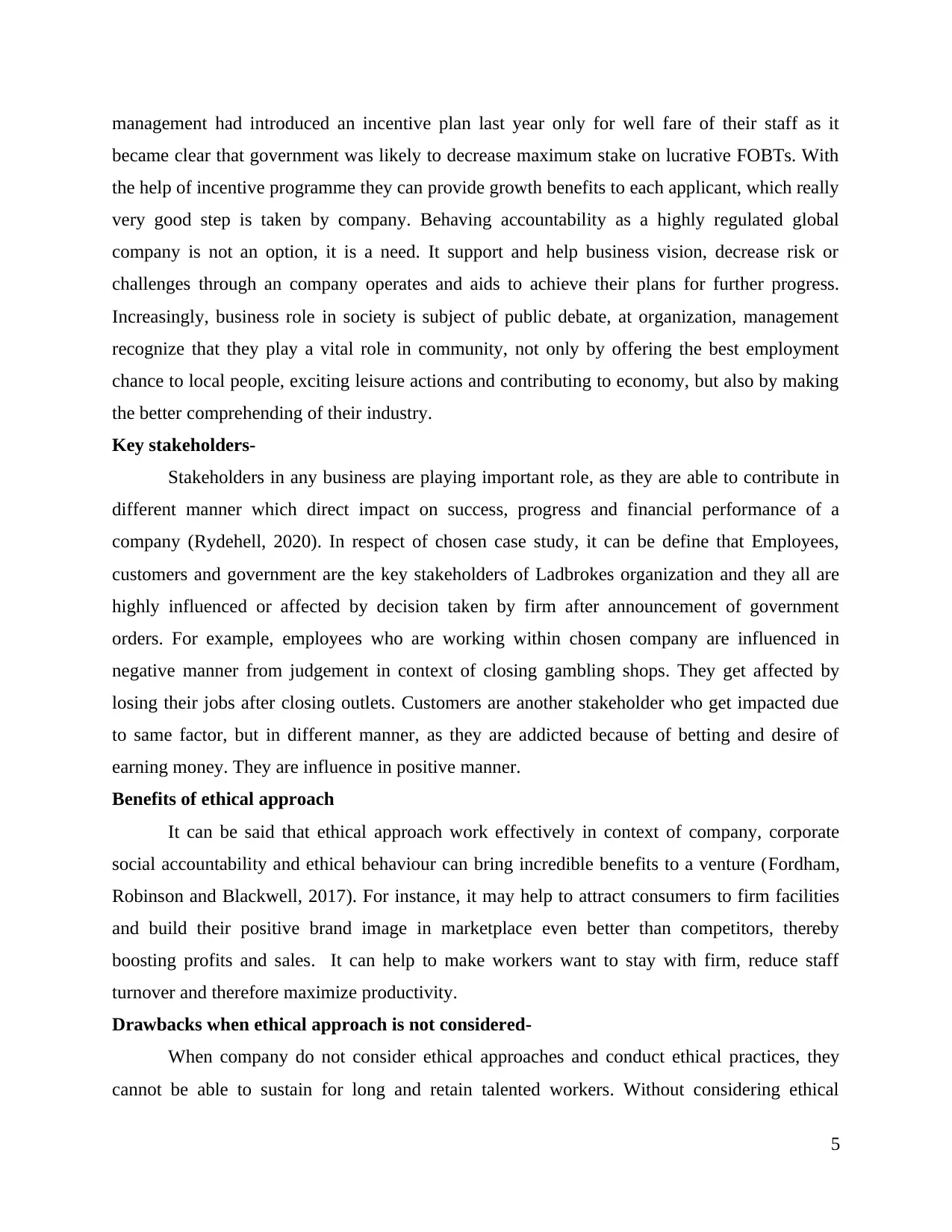
management had introduced an incentive plan last year only for well fare of their staff as it
became clear that government was likely to decrease maximum stake on lucrative FOBTs. With
the help of incentive programme they can provide growth benefits to each applicant, which really
very good step is taken by company. Behaving accountability as a highly regulated global
company is not an option, it is a need. It support and help business vision, decrease risk or
challenges through an company operates and aids to achieve their plans for further progress.
Increasingly, business role in society is subject of public debate, at organization, management
recognize that they play a vital role in community, not only by offering the best employment
chance to local people, exciting leisure actions and contributing to economy, but also by making
the better comprehending of their industry.
Key stakeholders-
Stakeholders in any business are playing important role, as they are able to contribute in
different manner which direct impact on success, progress and financial performance of a
company (Rydehell, 2020). In respect of chosen case study, it can be define that Employees,
customers and government are the key stakeholders of Ladbrokes organization and they all are
highly influenced or affected by decision taken by firm after announcement of government
orders. For example, employees who are working within chosen company are influenced in
negative manner from judgement in context of closing gambling shops. They get affected by
losing their jobs after closing outlets. Customers are another stakeholder who get impacted due
to same factor, but in different manner, as they are addicted because of betting and desire of
earning money. They are influence in positive manner.
Benefits of ethical approach
It can be said that ethical approach work effectively in context of company, corporate
social accountability and ethical behaviour can bring incredible benefits to a venture (Fordham,
Robinson and Blackwell, 2017). For instance, it may help to attract consumers to firm facilities
and build their positive brand image in marketplace even better than competitors, thereby
boosting profits and sales. It can help to make workers want to stay with firm, reduce staff
turnover and therefore maximize productivity.
Drawbacks when ethical approach is not considered-
When company do not consider ethical approaches and conduct ethical practices, they
cannot be able to sustain for long and retain talented workers. Without considering ethical
5
became clear that government was likely to decrease maximum stake on lucrative FOBTs. With
the help of incentive programme they can provide growth benefits to each applicant, which really
very good step is taken by company. Behaving accountability as a highly regulated global
company is not an option, it is a need. It support and help business vision, decrease risk or
challenges through an company operates and aids to achieve their plans for further progress.
Increasingly, business role in society is subject of public debate, at organization, management
recognize that they play a vital role in community, not only by offering the best employment
chance to local people, exciting leisure actions and contributing to economy, but also by making
the better comprehending of their industry.
Key stakeholders-
Stakeholders in any business are playing important role, as they are able to contribute in
different manner which direct impact on success, progress and financial performance of a
company (Rydehell, 2020). In respect of chosen case study, it can be define that Employees,
customers and government are the key stakeholders of Ladbrokes organization and they all are
highly influenced or affected by decision taken by firm after announcement of government
orders. For example, employees who are working within chosen company are influenced in
negative manner from judgement in context of closing gambling shops. They get affected by
losing their jobs after closing outlets. Customers are another stakeholder who get impacted due
to same factor, but in different manner, as they are addicted because of betting and desire of
earning money. They are influence in positive manner.
Benefits of ethical approach
It can be said that ethical approach work effectively in context of company, corporate
social accountability and ethical behaviour can bring incredible benefits to a venture (Fordham,
Robinson and Blackwell, 2017). For instance, it may help to attract consumers to firm facilities
and build their positive brand image in marketplace even better than competitors, thereby
boosting profits and sales. It can help to make workers want to stay with firm, reduce staff
turnover and therefore maximize productivity.
Drawbacks when ethical approach is not considered-
When company do not consider ethical approaches and conduct ethical practices, they
cannot be able to sustain for long and retain talented workers. Without considering ethical
5
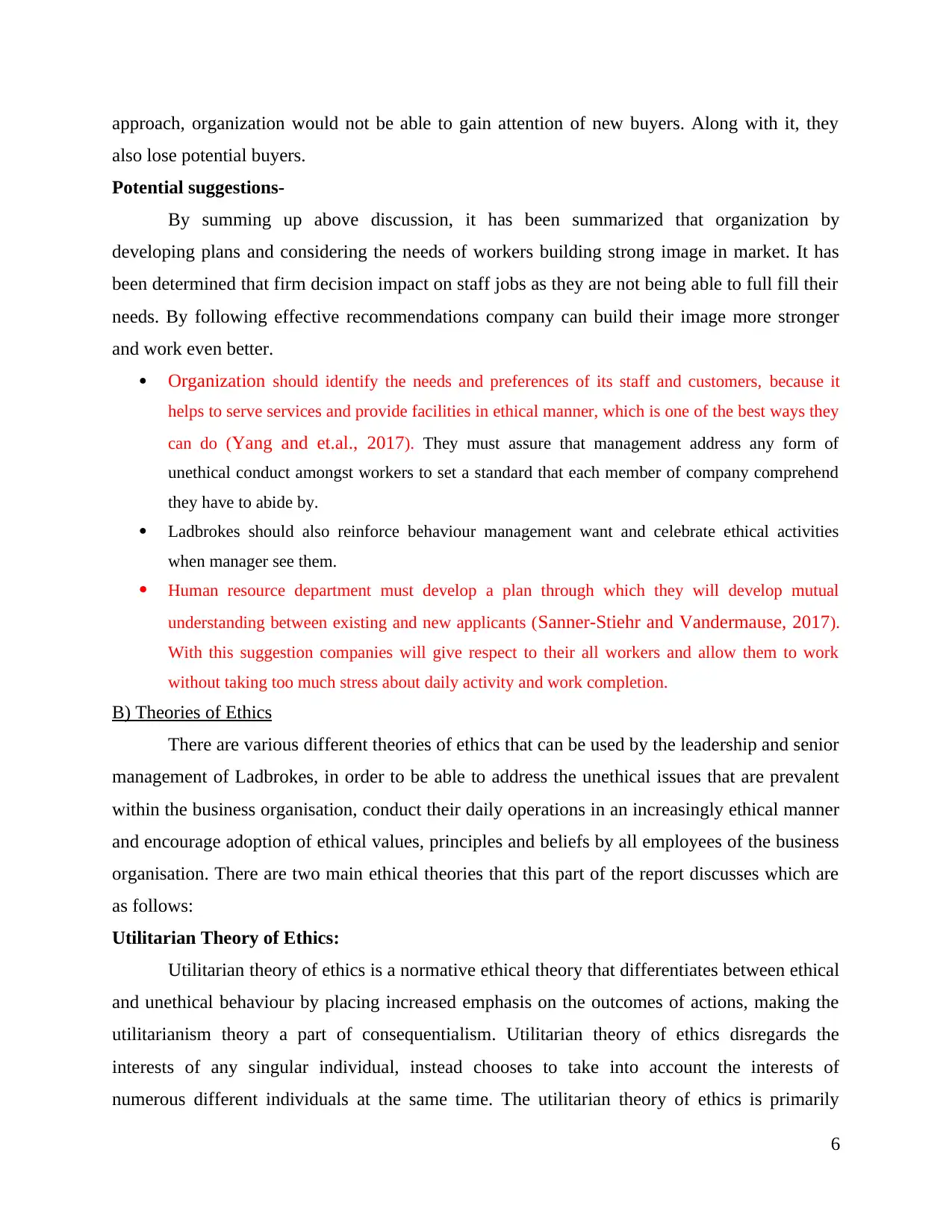
approach, organization would not be able to gain attention of new buyers. Along with it, they
also lose potential buyers.
Potential suggestions-
By summing up above discussion, it has been summarized that organization by
developing plans and considering the needs of workers building strong image in market. It has
been determined that firm decision impact on staff jobs as they are not being able to full fill their
needs. By following effective recommendations company can build their image more stronger
and work even better.
Organization should identify the needs and preferences of its staff and customers, because it
helps to serve services and provide facilities in ethical manner, which is one of the best ways they
can do (Yang and et.al., 2017). They must assure that management address any form of
unethical conduct amongst workers to set a standard that each member of company comprehend
they have to abide by.
Ladbrokes should also reinforce behaviour management want and celebrate ethical activities
when manager see them.
Human resource department must develop a plan through which they will develop mutual
understanding between existing and new applicants (Sanner-Stiehr and Vandermause, 2017).
With this suggestion companies will give respect to their all workers and allow them to work
without taking too much stress about daily activity and work completion.
B) Theories of Ethics
There are various different theories of ethics that can be used by the leadership and senior
management of Ladbrokes, in order to be able to address the unethical issues that are prevalent
within the business organisation, conduct their daily operations in an increasingly ethical manner
and encourage adoption of ethical values, principles and beliefs by all employees of the business
organisation. There are two main ethical theories that this part of the report discusses which are
as follows:
Utilitarian Theory of Ethics:
Utilitarian theory of ethics is a normative ethical theory that differentiates between ethical
and unethical behaviour by placing increased emphasis on the outcomes of actions, making the
utilitarianism theory a part of consequentialism. Utilitarian theory of ethics disregards the
interests of any singular individual, instead chooses to take into account the interests of
numerous different individuals at the same time. The utilitarian theory of ethics is primarily
6
also lose potential buyers.
Potential suggestions-
By summing up above discussion, it has been summarized that organization by
developing plans and considering the needs of workers building strong image in market. It has
been determined that firm decision impact on staff jobs as they are not being able to full fill their
needs. By following effective recommendations company can build their image more stronger
and work even better.
Organization should identify the needs and preferences of its staff and customers, because it
helps to serve services and provide facilities in ethical manner, which is one of the best ways they
can do (Yang and et.al., 2017). They must assure that management address any form of
unethical conduct amongst workers to set a standard that each member of company comprehend
they have to abide by.
Ladbrokes should also reinforce behaviour management want and celebrate ethical activities
when manager see them.
Human resource department must develop a plan through which they will develop mutual
understanding between existing and new applicants (Sanner-Stiehr and Vandermause, 2017).
With this suggestion companies will give respect to their all workers and allow them to work
without taking too much stress about daily activity and work completion.
B) Theories of Ethics
There are various different theories of ethics that can be used by the leadership and senior
management of Ladbrokes, in order to be able to address the unethical issues that are prevalent
within the business organisation, conduct their daily operations in an increasingly ethical manner
and encourage adoption of ethical values, principles and beliefs by all employees of the business
organisation. There are two main ethical theories that this part of the report discusses which are
as follows:
Utilitarian Theory of Ethics:
Utilitarian theory of ethics is a normative ethical theory that differentiates between ethical
and unethical behaviour by placing increased emphasis on the outcomes of actions, making the
utilitarianism theory a part of consequentialism. Utilitarian theory of ethics disregards the
interests of any singular individual, instead chooses to take into account the interests of
numerous different individuals at the same time. The utilitarian theory of ethics is primarily
6
⊘ This is a preview!⊘
Do you want full access?
Subscribe today to unlock all pages.

Trusted by 1+ million students worldwide
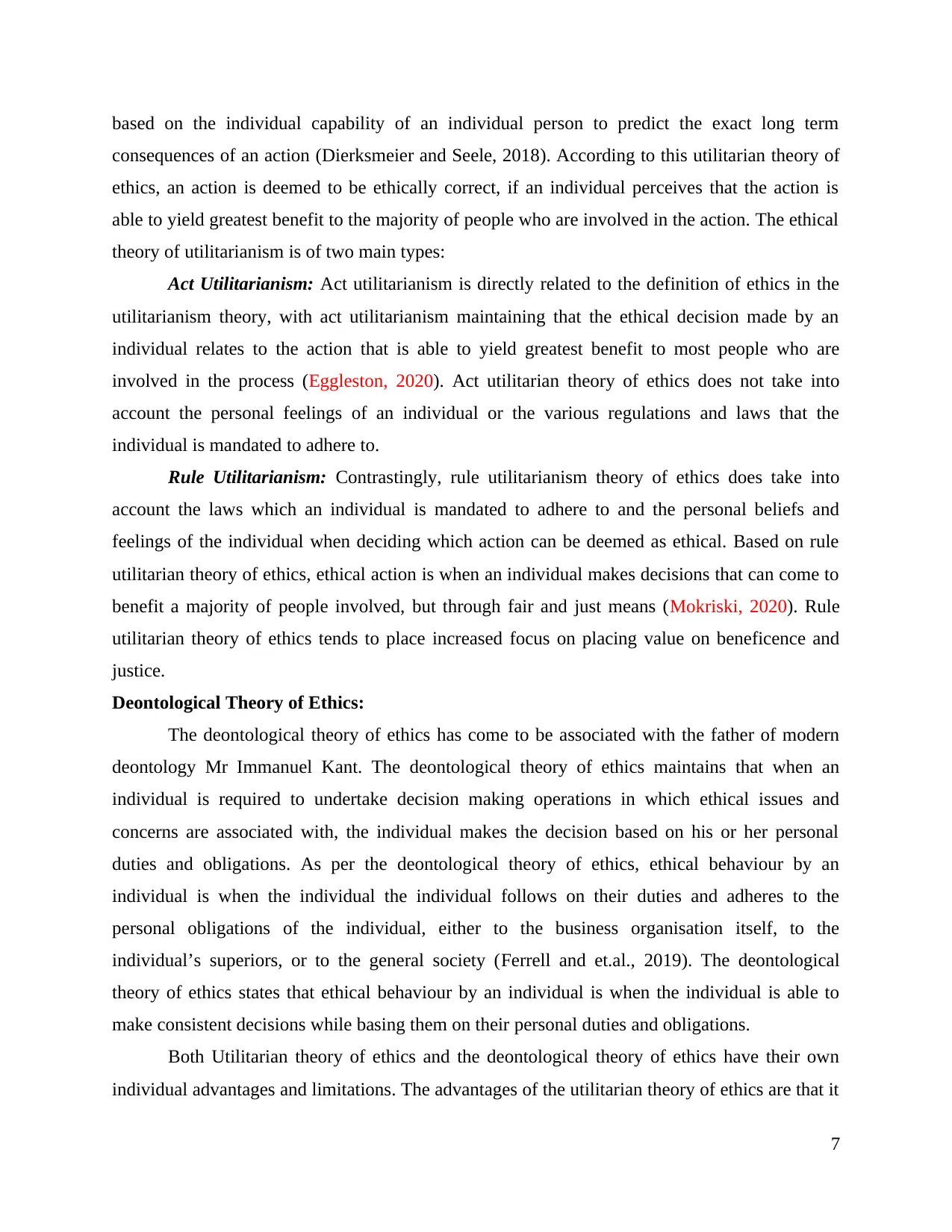
based on the individual capability of an individual person to predict the exact long term
consequences of an action (Dierksmeier and Seele, 2018). According to this utilitarian theory of
ethics, an action is deemed to be ethically correct, if an individual perceives that the action is
able to yield greatest benefit to the majority of people who are involved in the action. The ethical
theory of utilitarianism is of two main types:
Act Utilitarianism: Act utilitarianism is directly related to the definition of ethics in the
utilitarianism theory, with act utilitarianism maintaining that the ethical decision made by an
individual relates to the action that is able to yield greatest benefit to most people who are
involved in the process (Eggleston, 2020). Act utilitarian theory of ethics does not take into
account the personal feelings of an individual or the various regulations and laws that the
individual is mandated to adhere to.
Rule Utilitarianism: Contrastingly, rule utilitarianism theory of ethics does take into
account the laws which an individual is mandated to adhere to and the personal beliefs and
feelings of the individual when deciding which action can be deemed as ethical. Based on rule
utilitarian theory of ethics, ethical action is when an individual makes decisions that can come to
benefit a majority of people involved, but through fair and just means (Mokriski, 2020). Rule
utilitarian theory of ethics tends to place increased focus on placing value on beneficence and
justice.
Deontological Theory of Ethics:
The deontological theory of ethics has come to be associated with the father of modern
deontology Mr Immanuel Kant. The deontological theory of ethics maintains that when an
individual is required to undertake decision making operations in which ethical issues and
concerns are associated with, the individual makes the decision based on his or her personal
duties and obligations. As per the deontological theory of ethics, ethical behaviour by an
individual is when the individual the individual follows on their duties and adheres to the
personal obligations of the individual, either to the business organisation itself, to the
individual’s superiors, or to the general society (Ferrell and et.al., 2019). The deontological
theory of ethics states that ethical behaviour by an individual is when the individual is able to
make consistent decisions while basing them on their personal duties and obligations.
Both Utilitarian theory of ethics and the deontological theory of ethics have their own
individual advantages and limitations. The advantages of the utilitarian theory of ethics are that it
7
consequences of an action (Dierksmeier and Seele, 2018). According to this utilitarian theory of
ethics, an action is deemed to be ethically correct, if an individual perceives that the action is
able to yield greatest benefit to the majority of people who are involved in the action. The ethical
theory of utilitarianism is of two main types:
Act Utilitarianism: Act utilitarianism is directly related to the definition of ethics in the
utilitarianism theory, with act utilitarianism maintaining that the ethical decision made by an
individual relates to the action that is able to yield greatest benefit to most people who are
involved in the process (Eggleston, 2020). Act utilitarian theory of ethics does not take into
account the personal feelings of an individual or the various regulations and laws that the
individual is mandated to adhere to.
Rule Utilitarianism: Contrastingly, rule utilitarianism theory of ethics does take into
account the laws which an individual is mandated to adhere to and the personal beliefs and
feelings of the individual when deciding which action can be deemed as ethical. Based on rule
utilitarian theory of ethics, ethical action is when an individual makes decisions that can come to
benefit a majority of people involved, but through fair and just means (Mokriski, 2020). Rule
utilitarian theory of ethics tends to place increased focus on placing value on beneficence and
justice.
Deontological Theory of Ethics:
The deontological theory of ethics has come to be associated with the father of modern
deontology Mr Immanuel Kant. The deontological theory of ethics maintains that when an
individual is required to undertake decision making operations in which ethical issues and
concerns are associated with, the individual makes the decision based on his or her personal
duties and obligations. As per the deontological theory of ethics, ethical behaviour by an
individual is when the individual the individual follows on their duties and adheres to the
personal obligations of the individual, either to the business organisation itself, to the
individual’s superiors, or to the general society (Ferrell and et.al., 2019). The deontological
theory of ethics states that ethical behaviour by an individual is when the individual is able to
make consistent decisions while basing them on their personal duties and obligations.
Both Utilitarian theory of ethics and the deontological theory of ethics have their own
individual advantages and limitations. The advantages of the utilitarian theory of ethics are that it
7
Paraphrase This Document
Need a fresh take? Get an instant paraphrase of this document with our AI Paraphraser
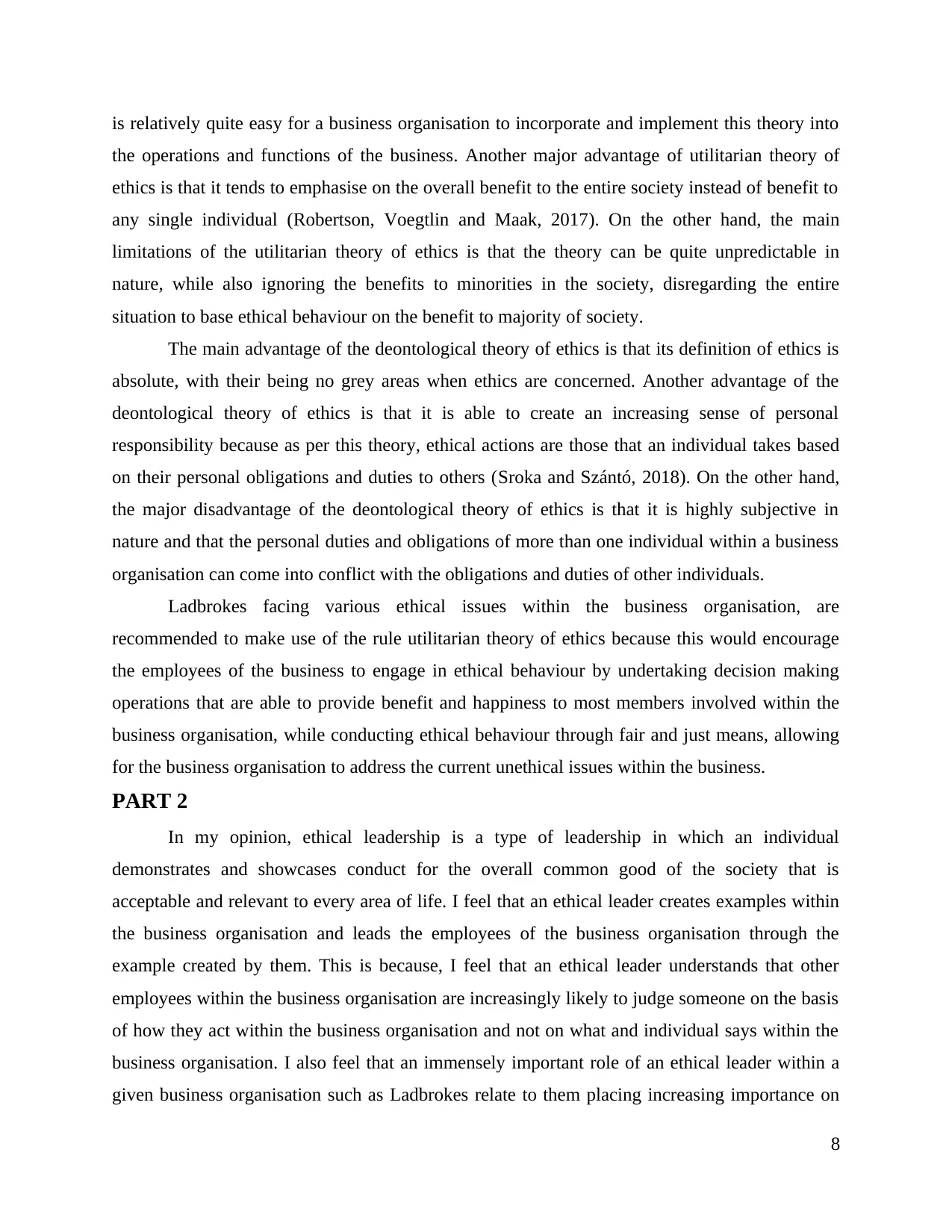
is relatively quite easy for a business organisation to incorporate and implement this theory into
the operations and functions of the business. Another major advantage of utilitarian theory of
ethics is that it tends to emphasise on the overall benefit to the entire society instead of benefit to
any single individual (Robertson, Voegtlin and Maak, 2017). On the other hand, the main
limitations of the utilitarian theory of ethics is that the theory can be quite unpredictable in
nature, while also ignoring the benefits to minorities in the society, disregarding the entire
situation to base ethical behaviour on the benefit to majority of society.
The main advantage of the deontological theory of ethics is that its definition of ethics is
absolute, with their being no grey areas when ethics are concerned. Another advantage of the
deontological theory of ethics is that it is able to create an increasing sense of personal
responsibility because as per this theory, ethical actions are those that an individual takes based
on their personal obligations and duties to others (Sroka and Szántó, 2018). On the other hand,
the major disadvantage of the deontological theory of ethics is that it is highly subjective in
nature and that the personal duties and obligations of more than one individual within a business
organisation can come into conflict with the obligations and duties of other individuals.
Ladbrokes facing various ethical issues within the business organisation, are
recommended to make use of the rule utilitarian theory of ethics because this would encourage
the employees of the business to engage in ethical behaviour by undertaking decision making
operations that are able to provide benefit and happiness to most members involved within the
business organisation, while conducting ethical behaviour through fair and just means, allowing
for the business organisation to address the current unethical issues within the business.
PART 2
In my opinion, ethical leadership is a type of leadership in which an individual
demonstrates and showcases conduct for the overall common good of the society that is
acceptable and relevant to every area of life. I feel that an ethical leader creates examples within
the business organisation and leads the employees of the business organisation through the
example created by them. This is because, I feel that an ethical leader understands that other
employees within the business organisation are increasingly likely to judge someone on the basis
of how they act within the business organisation and not on what and individual says within the
business organisation. I also feel that an immensely important role of an ethical leader within a
given business organisation such as Ladbrokes relate to them placing increasing importance on
8
the operations and functions of the business. Another major advantage of utilitarian theory of
ethics is that it tends to emphasise on the overall benefit to the entire society instead of benefit to
any single individual (Robertson, Voegtlin and Maak, 2017). On the other hand, the main
limitations of the utilitarian theory of ethics is that the theory can be quite unpredictable in
nature, while also ignoring the benefits to minorities in the society, disregarding the entire
situation to base ethical behaviour on the benefit to majority of society.
The main advantage of the deontological theory of ethics is that its definition of ethics is
absolute, with their being no grey areas when ethics are concerned. Another advantage of the
deontological theory of ethics is that it is able to create an increasing sense of personal
responsibility because as per this theory, ethical actions are those that an individual takes based
on their personal obligations and duties to others (Sroka and Szántó, 2018). On the other hand,
the major disadvantage of the deontological theory of ethics is that it is highly subjective in
nature and that the personal duties and obligations of more than one individual within a business
organisation can come into conflict with the obligations and duties of other individuals.
Ladbrokes facing various ethical issues within the business organisation, are
recommended to make use of the rule utilitarian theory of ethics because this would encourage
the employees of the business to engage in ethical behaviour by undertaking decision making
operations that are able to provide benefit and happiness to most members involved within the
business organisation, while conducting ethical behaviour through fair and just means, allowing
for the business organisation to address the current unethical issues within the business.
PART 2
In my opinion, ethical leadership is a type of leadership in which an individual
demonstrates and showcases conduct for the overall common good of the society that is
acceptable and relevant to every area of life. I feel that an ethical leader creates examples within
the business organisation and leads the employees of the business organisation through the
example created by them. This is because, I feel that an ethical leader understands that other
employees within the business organisation are increasingly likely to judge someone on the basis
of how they act within the business organisation and not on what and individual says within the
business organisation. I also feel that an immensely important role of an ethical leader within a
given business organisation such as Ladbrokes relate to them placing increasing importance on
8
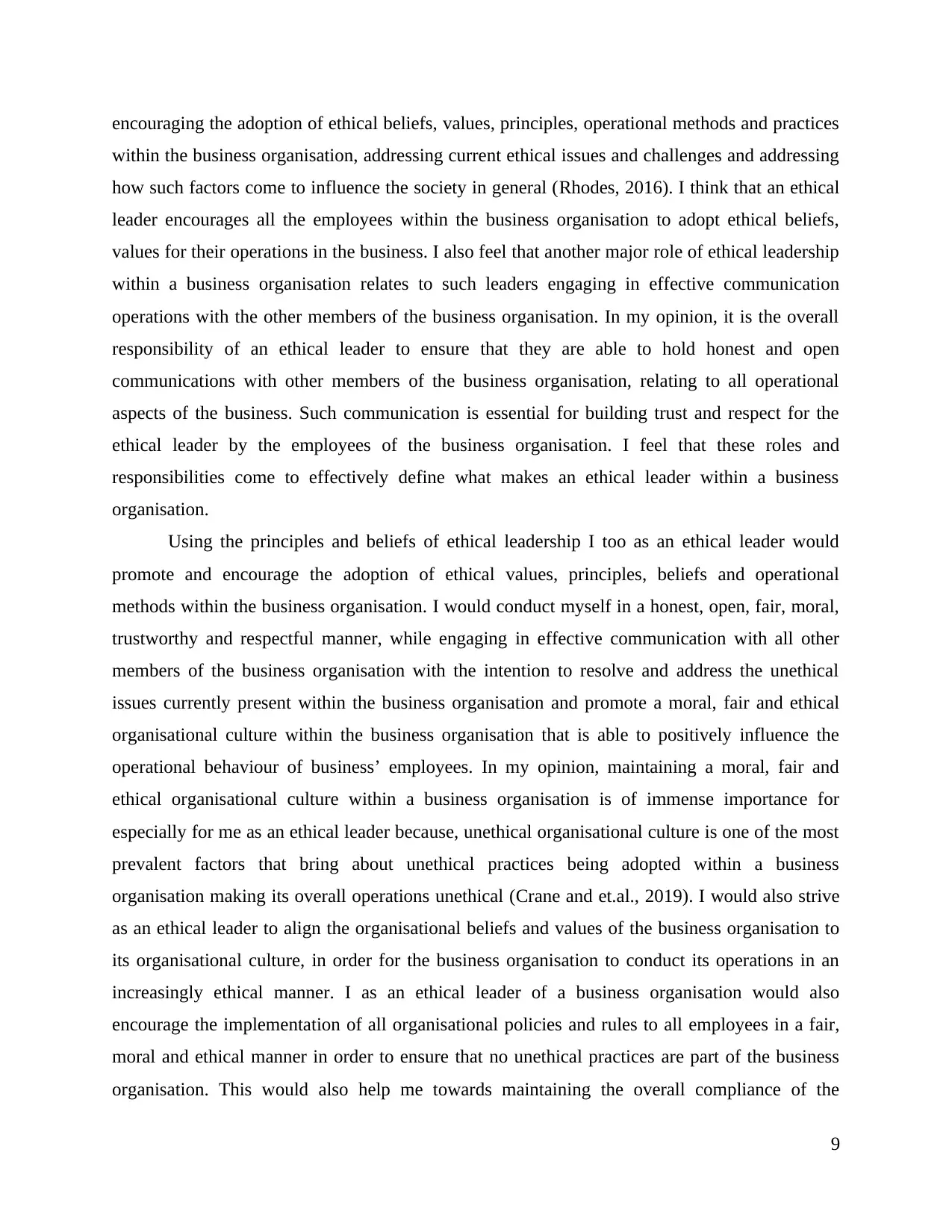
encouraging the adoption of ethical beliefs, values, principles, operational methods and practices
within the business organisation, addressing current ethical issues and challenges and addressing
how such factors come to influence the society in general (Rhodes, 2016). I think that an ethical
leader encourages all the employees within the business organisation to adopt ethical beliefs,
values for their operations in the business. I also feel that another major role of ethical leadership
within a business organisation relates to such leaders engaging in effective communication
operations with the other members of the business organisation. In my opinion, it is the overall
responsibility of an ethical leader to ensure that they are able to hold honest and open
communications with other members of the business organisation, relating to all operational
aspects of the business. Such communication is essential for building trust and respect for the
ethical leader by the employees of the business organisation. I feel that these roles and
responsibilities come to effectively define what makes an ethical leader within a business
organisation.
Using the principles and beliefs of ethical leadership I too as an ethical leader would
promote and encourage the adoption of ethical values, principles, beliefs and operational
methods within the business organisation. I would conduct myself in a honest, open, fair, moral,
trustworthy and respectful manner, while engaging in effective communication with all other
members of the business organisation with the intention to resolve and address the unethical
issues currently present within the business organisation and promote a moral, fair and ethical
organisational culture within the business organisation that is able to positively influence the
operational behaviour of business’ employees. In my opinion, maintaining a moral, fair and
ethical organisational culture within a business organisation is of immense importance for
especially for me as an ethical leader because, unethical organisational culture is one of the most
prevalent factors that bring about unethical practices being adopted within a business
organisation making its overall operations unethical (Crane and et.al., 2019). I would also strive
as an ethical leader to align the organisational beliefs and values of the business organisation to
its organisational culture, in order for the business organisation to conduct its operations in an
increasingly ethical manner. I as an ethical leader of a business organisation would also
encourage the implementation of all organisational policies and rules to all employees in a fair,
moral and ethical manner in order to ensure that no unethical practices are part of the business
organisation. This would also help me towards maintaining the overall compliance of the
9
within the business organisation, addressing current ethical issues and challenges and addressing
how such factors come to influence the society in general (Rhodes, 2016). I think that an ethical
leader encourages all the employees within the business organisation to adopt ethical beliefs,
values for their operations in the business. I also feel that another major role of ethical leadership
within a business organisation relates to such leaders engaging in effective communication
operations with the other members of the business organisation. In my opinion, it is the overall
responsibility of an ethical leader to ensure that they are able to hold honest and open
communications with other members of the business organisation, relating to all operational
aspects of the business. Such communication is essential for building trust and respect for the
ethical leader by the employees of the business organisation. I feel that these roles and
responsibilities come to effectively define what makes an ethical leader within a business
organisation.
Using the principles and beliefs of ethical leadership I too as an ethical leader would
promote and encourage the adoption of ethical values, principles, beliefs and operational
methods within the business organisation. I would conduct myself in a honest, open, fair, moral,
trustworthy and respectful manner, while engaging in effective communication with all other
members of the business organisation with the intention to resolve and address the unethical
issues currently present within the business organisation and promote a moral, fair and ethical
organisational culture within the business organisation that is able to positively influence the
operational behaviour of business’ employees. In my opinion, maintaining a moral, fair and
ethical organisational culture within a business organisation is of immense importance for
especially for me as an ethical leader because, unethical organisational culture is one of the most
prevalent factors that bring about unethical practices being adopted within a business
organisation making its overall operations unethical (Crane and et.al., 2019). I would also strive
as an ethical leader to align the organisational beliefs and values of the business organisation to
its organisational culture, in order for the business organisation to conduct its operations in an
increasingly ethical manner. I as an ethical leader of a business organisation would also
encourage the implementation of all organisational policies and rules to all employees in a fair,
moral and ethical manner in order to ensure that no unethical practices are part of the business
organisation. This would also help me towards maintaining the overall compliance of the
9
⊘ This is a preview!⊘
Do you want full access?
Subscribe today to unlock all pages.

Trusted by 1+ million students worldwide
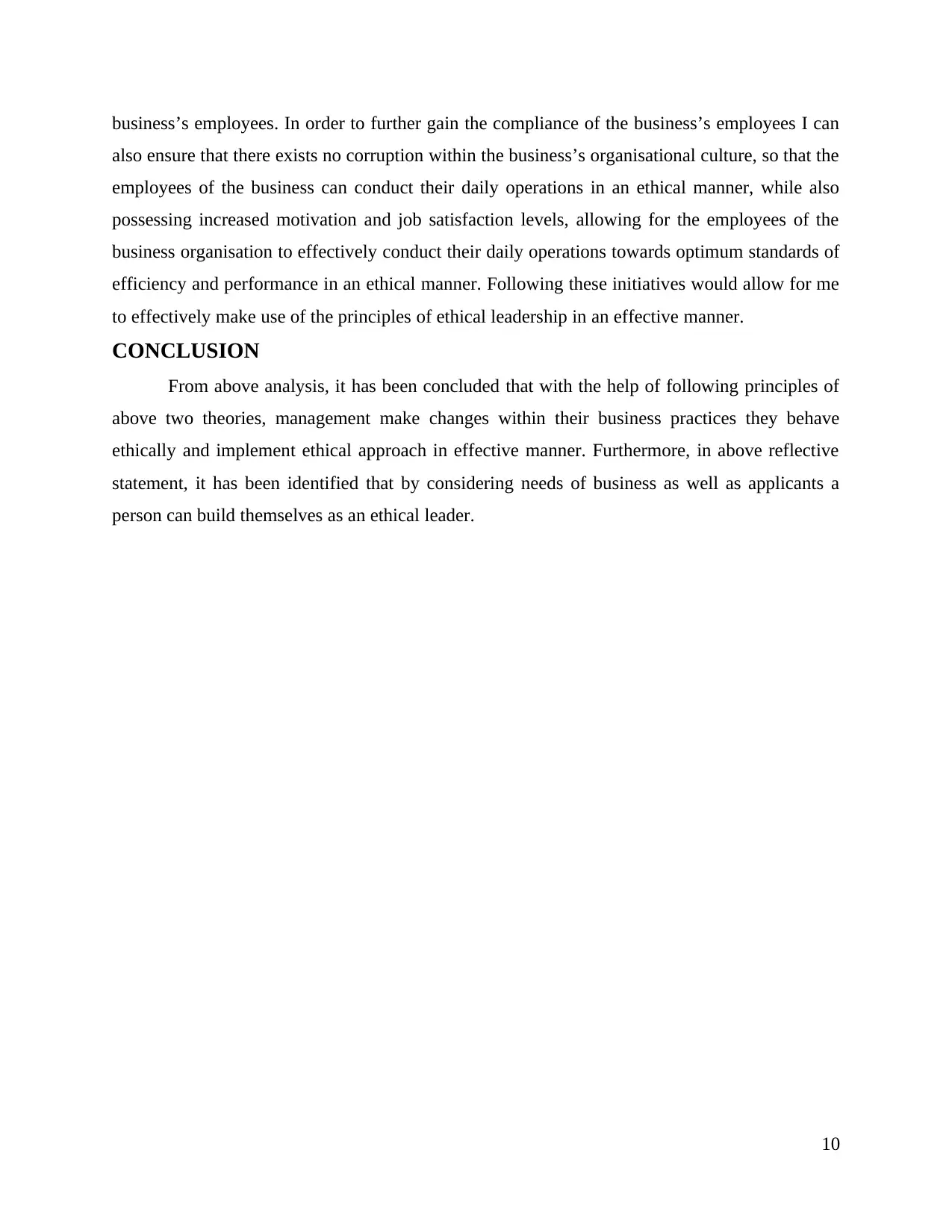
business’s employees. In order to further gain the compliance of the business’s employees I can
also ensure that there exists no corruption within the business’s organisational culture, so that the
employees of the business can conduct their daily operations in an ethical manner, while also
possessing increased motivation and job satisfaction levels, allowing for the employees of the
business organisation to effectively conduct their daily operations towards optimum standards of
efficiency and performance in an ethical manner. Following these initiatives would allow for me
to effectively make use of the principles of ethical leadership in an effective manner.
CONCLUSION
From above analysis, it has been concluded that with the help of following principles of
above two theories, management make changes within their business practices they behave
ethically and implement ethical approach in effective manner. Furthermore, in above reflective
statement, it has been identified that by considering needs of business as well as applicants a
person can build themselves as an ethical leader.
10
also ensure that there exists no corruption within the business’s organisational culture, so that the
employees of the business can conduct their daily operations in an ethical manner, while also
possessing increased motivation and job satisfaction levels, allowing for the employees of the
business organisation to effectively conduct their daily operations towards optimum standards of
efficiency and performance in an ethical manner. Following these initiatives would allow for me
to effectively make use of the principles of ethical leadership in an effective manner.
CONCLUSION
From above analysis, it has been concluded that with the help of following principles of
above two theories, management make changes within their business practices they behave
ethically and implement ethical approach in effective manner. Furthermore, in above reflective
statement, it has been identified that by considering needs of business as well as applicants a
person can build themselves as an ethical leader.
10
Paraphrase This Document
Need a fresh take? Get an instant paraphrase of this document with our AI Paraphraser
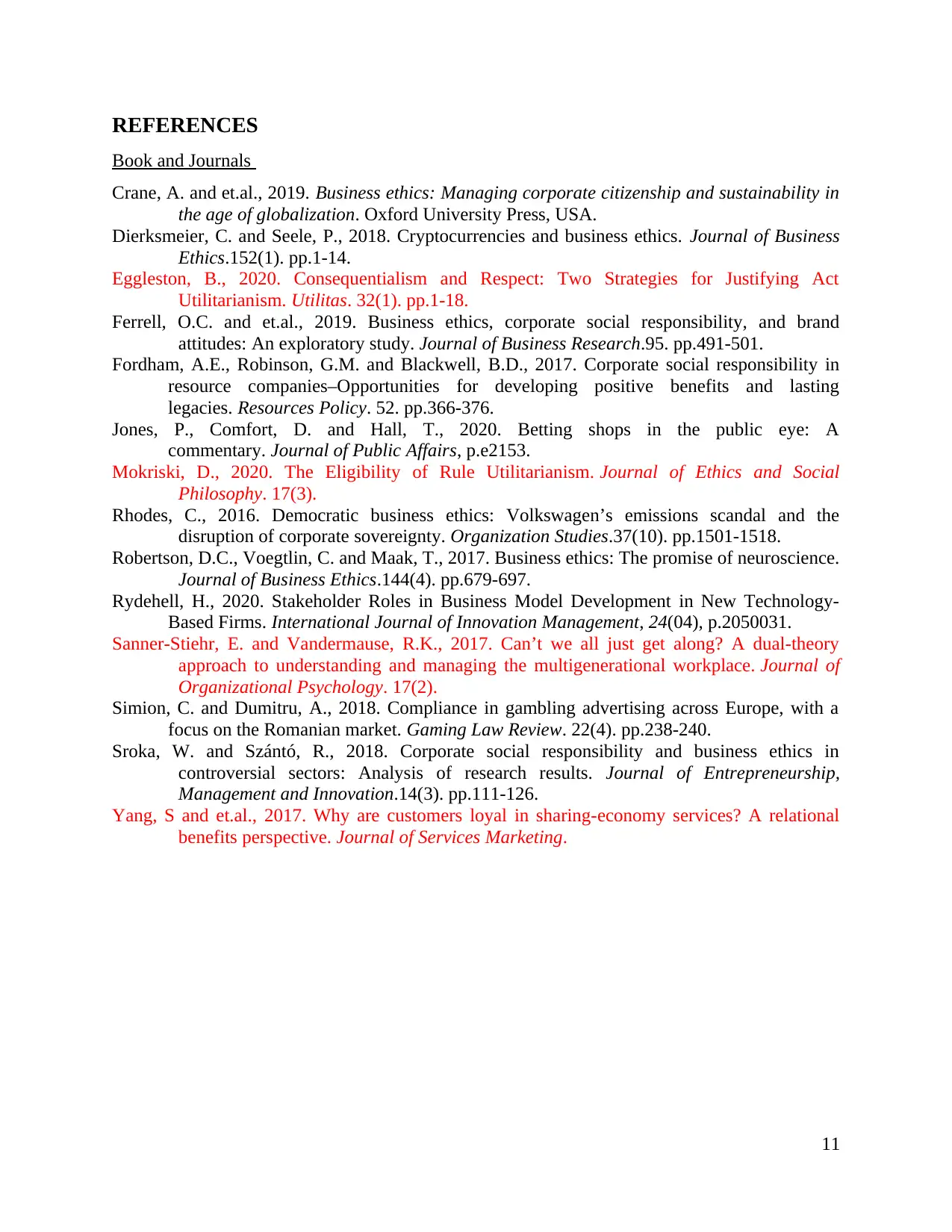
REFERENCES
Book and Journals
Crane, A. and et.al., 2019. Business ethics: Managing corporate citizenship and sustainability in
the age of globalization. Oxford University Press, USA.
Dierksmeier, C. and Seele, P., 2018. Cryptocurrencies and business ethics. Journal of Business
Ethics.152(1). pp.1-14.
Eggleston, B., 2020. Consequentialism and Respect: Two Strategies for Justifying Act
Utilitarianism. Utilitas. 32(1). pp.1-18.
Ferrell, O.C. and et.al., 2019. Business ethics, corporate social responsibility, and brand
attitudes: An exploratory study. Journal of Business Research.95. pp.491-501.
Fordham, A.E., Robinson, G.M. and Blackwell, B.D., 2017. Corporate social responsibility in
resource companies–Opportunities for developing positive benefits and lasting
legacies. Resources Policy. 52. pp.366-376.
Jones, P., Comfort, D. and Hall, T., 2020. Betting shops in the public eye: A
commentary. Journal of Public Affairs, p.e2153.
Mokriski, D., 2020. The Eligibility of Rule Utilitarianism. Journal of Ethics and Social
Philosophy. 17(3).
Rhodes, C., 2016. Democratic business ethics: Volkswagen’s emissions scandal and the
disruption of corporate sovereignty. Organization Studies.37(10). pp.1501-1518.
Robertson, D.C., Voegtlin, C. and Maak, T., 2017. Business ethics: The promise of neuroscience.
Journal of Business Ethics.144(4). pp.679-697.
Rydehell, H., 2020. Stakeholder Roles in Business Model Development in New Technology-
Based Firms. International Journal of Innovation Management, 24(04), p.2050031.
Sanner-Stiehr, E. and Vandermause, R.K., 2017. Can’t we all just get along? A dual-theory
approach to understanding and managing the multigenerational workplace. Journal of
Organizational Psychology. 17(2).
Simion, C. and Dumitru, A., 2018. Compliance in gambling advertising across Europe, with a
focus on the Romanian market. Gaming Law Review. 22(4). pp.238-240.
Sroka, W. and Szántó, R., 2018. Corporate social responsibility and business ethics in
controversial sectors: Analysis of research results. Journal of Entrepreneurship,
Management and Innovation.14(3). pp.111-126.
Yang, S and et.al., 2017. Why are customers loyal in sharing-economy services? A relational
benefits perspective. Journal of Services Marketing.
11
Book and Journals
Crane, A. and et.al., 2019. Business ethics: Managing corporate citizenship and sustainability in
the age of globalization. Oxford University Press, USA.
Dierksmeier, C. and Seele, P., 2018. Cryptocurrencies and business ethics. Journal of Business
Ethics.152(1). pp.1-14.
Eggleston, B., 2020. Consequentialism and Respect: Two Strategies for Justifying Act
Utilitarianism. Utilitas. 32(1). pp.1-18.
Ferrell, O.C. and et.al., 2019. Business ethics, corporate social responsibility, and brand
attitudes: An exploratory study. Journal of Business Research.95. pp.491-501.
Fordham, A.E., Robinson, G.M. and Blackwell, B.D., 2017. Corporate social responsibility in
resource companies–Opportunities for developing positive benefits and lasting
legacies. Resources Policy. 52. pp.366-376.
Jones, P., Comfort, D. and Hall, T., 2020. Betting shops in the public eye: A
commentary. Journal of Public Affairs, p.e2153.
Mokriski, D., 2020. The Eligibility of Rule Utilitarianism. Journal of Ethics and Social
Philosophy. 17(3).
Rhodes, C., 2016. Democratic business ethics: Volkswagen’s emissions scandal and the
disruption of corporate sovereignty. Organization Studies.37(10). pp.1501-1518.
Robertson, D.C., Voegtlin, C. and Maak, T., 2017. Business ethics: The promise of neuroscience.
Journal of Business Ethics.144(4). pp.679-697.
Rydehell, H., 2020. Stakeholder Roles in Business Model Development in New Technology-
Based Firms. International Journal of Innovation Management, 24(04), p.2050031.
Sanner-Stiehr, E. and Vandermause, R.K., 2017. Can’t we all just get along? A dual-theory
approach to understanding and managing the multigenerational workplace. Journal of
Organizational Psychology. 17(2).
Simion, C. and Dumitru, A., 2018. Compliance in gambling advertising across Europe, with a
focus on the Romanian market. Gaming Law Review. 22(4). pp.238-240.
Sroka, W. and Szántó, R., 2018. Corporate social responsibility and business ethics in
controversial sectors: Analysis of research results. Journal of Entrepreneurship,
Management and Innovation.14(3). pp.111-126.
Yang, S and et.al., 2017. Why are customers loyal in sharing-economy services? A relational
benefits perspective. Journal of Services Marketing.
11
1 out of 11
Related Documents
Your All-in-One AI-Powered Toolkit for Academic Success.
+13062052269
info@desklib.com
Available 24*7 on WhatsApp / Email
![[object Object]](/_next/static/media/star-bottom.7253800d.svg)
Unlock your academic potential
Copyright © 2020–2026 A2Z Services. All Rights Reserved. Developed and managed by ZUCOL.





